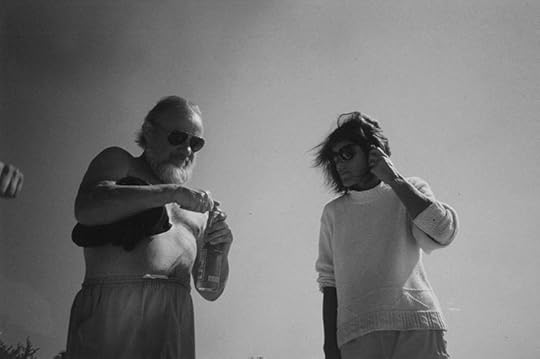Ten Questions for Joy Williams

WITH ROBERT STONE IN KEY WEST, CA. 1995.
“Forgive me for the things I have done and for the things I have left undone,” Joy Williams said in 2014, in her Paris Review Art of Fiction interview. “I may very well write out of a sense of guilt.” Her new story “After the Haiku Period,” which appears in the Review’s Summer 2025 issue, is a story of guilt askew, which centers on a pair of twins in their sixties, the daughters of a coal-bed-methane-drilling-company tycoon (“We called Daddy Midas,” one sister says. “Everything he touched turned into some ghastly energy source”) and their devoted “sage,” Jimmy, who knows just what to pack for their picnics. Fueled by white wine, lemon squares, and family shame, Camilla and Candida make a pastime of hatching dramatic plots to make the “destroyers and despoilers and death dealers” pay—until finally, one night, they take the plunge. Williams—who has published twelve stories in The Paris Review, dating back to 1968—is hesitant to talk about craft. (“I do believe there is, in fact, a mystery to the whole enterprise that one dares to investigate at peril,” she said in her interview.) Still, we couldn’t resist sending her a few questions about the mysterious enterprise of this particular story, which she responded to over email.
THE EDITORS
Will you tell us about where you’re writing to us from, and set the scene?
WILLIAMS
The desert, where it’s 110 degrees.
EDITORS
How did this story begin for you? Was it with an image, a sentence? The names of the twins, perhaps?
WILLIAMS
It was actually a vision of the leeches on a lakeshore—a sizzling chili red and long as baguettes.
EDITORS
When did you write the story, and did it come easily? Did you revise it very much, and if so, how did it change?
WILLIAMS
The ladies were floating around in conversation with themselves. Jimmy was a late addition. I really want to thank the fact-checkers at The Paris Review—I misstated a conversation between Ratty and Mole in The Wind in the Willows and they caught it big-time, as well as the gestation period of the humpback whale.
EDITORS
Do you think of yourself as a writer interested in social class?
WILLIAMS
The thought of two upper-class ladies attacking a slaughterhouse enchanted me.
EDITORS
What have you noticed about twins, or about the children of rich people?
WILLIAMS
I don’t know any rich people, or twins, for that matter.
EDITORS
Music comes up a few times in this story—the hope that some melody might change hearts and minds. What role does music play in your life?
WILLIAMS
I play CDs all the while I write. Glenn Gould, the music of Gurdjieff and de Hartmann … my old friends.
EDITORS
How have you been feeling, of late, about our ethical commitments to animals and nonhumans?
WILLIAMS
I do think people should think of the role of abattoirs more.
EDITORS
Camilla’s worldview is formed in part by Upton Sinclair’s The Jungle. When did you read that book, and how did you respond to it?
WILLIAMS
I never finished reading The Jungle as a child.
EDITORS
The story refers to the twins’ father’s participation in “the Slaughter, when all animal life was being extinguished by guns and strychnine.” One of our editors found herself googling to see if it was a real event. Is it? Can you tell us about the Slaughter?
WILLIAMS
Post–Civil War, the military and many helpful folk with rifles set out to exterminate the buffalo and other animal life on the plains as a means to eliminate the Indians.
EDITORS
What is the poet Issa doing in this story? Are you also disappointed with his bathtub poem?
WILLIAMS
Issa can pop up anywhere. I find his death poem very funny.
“After the Haiku Period” appears in Joy Williams’s forthcoming collection The Pelican Child, which will be published by Knopf in November.
The Paris Review's Blog
- The Paris Review's profile
- 305 followers



